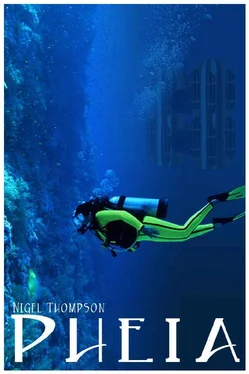Nigel Thompson - Pheia
Здесь есть возможность читать онлайн «Nigel Thompson - Pheia» весь текст электронной книги совершенно бесплатно (целиком полную версию без сокращений). В некоторых случаях можно слушать аудио, скачать через торрент в формате fb2 и присутствует краткое содержание. Год выпуска: 2016, Издательство: Kindle, Жанр: Фантастика и фэнтези, Морские приключения, на английском языке. Описание произведения, (предисловие) а так же отзывы посетителей доступны на портале библиотеки ЛибКат.
- Название:Pheia
- Автор:
- Издательство:Kindle
- Жанр:
- Год:2016
- ISBN:нет данных
- Рейтинг книги:4 / 5. Голосов: 1
-
Избранное:Добавить в избранное
- Отзывы:
-
Ваша оценка:
- 80
- 1
- 2
- 3
- 4
- 5
Pheia: краткое содержание, описание и аннотация
Предлагаем к чтению аннотацию, описание, краткое содержание или предисловие (зависит от того, что написал сам автор книги «Pheia»). Если вы не нашли необходимую информацию о книге — напишите в комментариях, мы постараемся отыскать её.
An accident on the bottom leaves just three members of the crew struggling for survival.
Pheia — читать онлайн бесплатно полную книгу (весь текст) целиком
Ниже представлен текст книги, разбитый по страницам. Система сохранения места последней прочитанной страницы, позволяет с удобством читать онлайн бесплатно книгу «Pheia», без необходимости каждый раз заново искать на чём Вы остановились. Поставьте закладку, и сможете в любой момент перейти на страницу, на которой закончили чтение.
Интервал:
Закладка:
The hours dragged by very slowly and she found herself in tears more than once and couldn’t even explain why.
The Pheia had a ship’s log as part of the computer system and Kate had made a few entries just to pass the time. Initially these were very brief: “Had Spaghetti again”; but later she tried to write down what had happened to the crew and some thoughts about each person. She had found it very hard to visualize all the faces. It wasn’t that she couldn’t remember what they looked like, rather that it was very painful to bring their faces back into her present thoughts.
In some cases she realized that she didn’t really know much about the person. She knew what their function aboard the Pheia was but not anything about who they really were. This bothered her a lot. At times she felt very distressed that she would have nothing to say to their family when she got to the surface. She had to keep reminding herself that it wasn’t her fault they were dead, but she had a good dose of survivor’s guilt that she just couldn’t shake.
The hours dragged on and Kate tried to keep her monitoring schedule on the top of every hour as something to look forward to doing. She also added notes in the ship’s log about the items of trash that she saw on the wall. There wasn’t much to see but spotting anything felt like an event that she needed to record.
On the surface, David Williams had become frantic about the total lack of communication from the Pheia. In the communications shack, he kept asking the same question: “Why haven’t they replied to any of our messages?”
The technician running the comms system had given up providing the “I don’t know sir” answer and just left Williams’ question hanging.
The last message Williams had seen was that the Pheia was anchoring itself to the wall. This was an automated ELF transmission consisting of just three letters: ANC.
The team had spent a lot of time working out a set of three-letter codes for every possible situation they could think of. Some had obvious meaning like SOS, but after thinking up the first few themselves, they had just let the computer pick them. After all, the computers in the ELF radios could do all the translation to or from English. The operator just picked the message to send and the computer keyed the ELF sequence into the transmitter. When the ELF receiver picked up a message sequence it translated it and put it on the screen. Messages were sent three times a few seconds apart to ensure they were received correctly.
Williams knew something was wrong about an hour after the anchoring message had been received because they should have also received another status report to say that the anchoring had been completed OK and the Pheia was stable.
At first, the consensus amongst the support crew had been that the main ELF transmitter had failed. The unit was an experimental portable design and had not had a lot of field testing. It was also possible that the antenna wire that the Pheia trailed above it had become disconnected from the hab. He thought there might be spare antenna wire sets on the Pheia, so the crew should have figured out the problem and deployed a new one by now. Williams thought that any simple problem like this should already have been fixed.
At a review meeting held six hours after last contact, it was revealed that the backup ELF radio had not arrived in Cayman until after the Pheia had descended. This added to the theory that the ELF receiver or transmitter was broken.
The support crew had lowered a passive sonar listening device to 200 feet below the surface in an attempt to pick up sounds from the hab. They had hoped to hear the sounds of the Pheia’s drive motors if it was still in free flight or perhaps the sounds of the crew. Nothing had been heard from below. The waters around Cayman are full of dive boats and fishing boats so there had been a lot of other clutter which may have masked any sounds from the trench. It was also likely that any sounds from the Pheia were simply bouncing of the thermocline and never reaching the surface.
It had been suggested that they try to get a Navy vessel with a powerful active sonar to ping the Pheia but Williams had discounted that idea when he spoke to the crew.
“Even if we could direct the energy straight down the wall, there are lots of factors that might preclude a good echo. For one, the Pheia is very close to the wall and there are numerous protrusions all over the wall, likely including above the Pheia. Another factor of course is the thermocline. I don’t know a lot about the Navy sonar systems but a little reading has led me to believe that it would be difficult to get the signal down through the layer in the first place and most of the return signal would also be scattered by it. But the biggest issue in my mind is that even if we got a good response from the Pheia, all that would tell us is the depth she is at. It tells us nothing about her condition or the condition of the crew. Neither does it afford us a mechanism with which to communicate with the crew. Our esteemed comms technician suggested we might modulate it into Morse code and send messages that way but we have no idea if anyone aboard knows Morse code. I looked through the personnel records to see if anyone had listed ham radio as a hobby and also inquired if it was common practice for Navy divers to learn Morse. I shall not repeat the response I got to that last question, but it was essentially negative. So in the short term I do not think we have any way to contact the Pheia and we must instead maintain our listening station in case they manage to repair the ELF system. The crew of the Pheia has a good combination of ex-military personnel and academics so between them they should be able to find a solution to the communications problem. I might add that I have sent out a short press release stating that we have a communications problem that we hope will be resolved shortly. Thus far it has had no response. I have also had a short statement about the communications problem posted to our Facebook page. In contrast to the press release, there was a huge response, some of it quite helpful and along the lines we have considered ourselves. There was also the usual collection of alien theories.”
Williams had not intended to make a speech but as he began talking it seemed important to lay out the facts as known. People loved to speculate, and he needed their attention on monitoring the systems in case the Pheia sent a message. He had also had to fend off the assorted rescue ideas. The Pheia was far too deep for any kind of manned rescue mission that they could organize. The U.S. Navy was capable of reaching that depth but it might take weeks to organize that help if it was possible at all. Not to mention that the Cayman government would have to authorize the operation and while they were capable of being reasonable they also had a very obstinate streak when it came to dealing with other governments. The best idea they had come up with was to fit out an autonomous ROV with the spare ELF radio and send it down there. The idea had a good deal of merit. The ROVs they had available had plenty of battery life if they kept the big lights off, and in any case this need only be a one way mission so all the ROV needed was to be set up with a slight negative buoyancy and then use its drive motors to maintain position from the wall. The potential power drain was well inside the battery capacity.
The problem with the ROV idea was that they were not rated for the depth the Pheia was at. The compartment that held the control electronics and kept it dry would probably collapse way before it reached the hab’s location. The Pheia's own ROV had gone down in the hab's gas atmosphere and would only have been sealed for a dive when it was needed.
Williams had been in discussion with the institute about modifying an ROV to use the same gel fill as used in the Pheia’s electronics and they were already working on a way to inject the gel and run some pool trials. If that was successful, they might have the ROV on site in a week.
Читать дальшеИнтервал:
Закладка:
Похожие книги на «Pheia»
Представляем Вашему вниманию похожие книги на «Pheia» списком для выбора. Мы отобрали схожую по названию и смыслу литературу в надежде предоставить читателям больше вариантов отыскать новые, интересные, ещё непрочитанные произведения.
Обсуждение, отзывы о книге «Pheia» и просто собственные мнения читателей. Оставьте ваши комментарии, напишите, что Вы думаете о произведении, его смысле или главных героях. Укажите что конкретно понравилось, а что нет, и почему Вы так считаете.












